Rose gardens and chilly climes in Ta’if, Saudi’s summer capital
Cool weather is a phenomenon not often associated with Saudi Arabia. The nation of seemingly endless deserts, scorching hot temperatures and baking plains concealing oil deposits is not a place that would spring to many a mind when discussing chilly rose gardens. However that is exactly where I found myself towards the end of my trip through Saudi Arabia’s Hejaz region.

While Saudi Arabia is undoubtedly a predominantly arid land, it’s not all flat. The vast deserts of popular parlance exist mostly in the centre, east and south of the country. In the west a rocky mountain range rises of the peninsula, running the length of the nation from north to south.
The region’s name ‘Hejaz’ is derived from the Arabic word ‘to separate’, and refers to the range which separate the deserts of Saudi Arabia from the narrow strip of coastal plains on the Red Sea. The region takes in the cities of Jeddah, Makkah and Madinah, cities all influenced by their positions in or near mountain valleys. However while Jeddah is defined by its history as a port, and Madinah and Makkah by their spiritual gravitas, no city is as synonymous with the mountain range as Ta’if.
At 1,879m above sea level, Ta’if rarely sees temperatures over 40C in summer (while the rest of the country routinely tops 50C), while summer nights are often a pleasant 20C. On winter nights the mercury occasionally dips below zero, and a light dusting of snow, although rare, is not unheard of.

As such Ta’if has long been seen as something of a summer capital in the Arabian peninsula and in modern day Saudi Arabia. For centuries royal families, whether they were based in Istanbul, Makkah or Riyadh, have owned mansions and palaces in this most temperate of Saudi cities. Escaping the heat of the lowlands, those with the means would escape to the city between May and September and engage in the pursuits of the wealthy such as horse racing and falconry. The region cultivates grapes, figs, pomegranates and honey, but it’s the roses that are its most famous export; not plants specifically, but the oil extracted from them.
It’s difficult to tell exactly which one came first; the Arabic penchant for rosewater and essence (in everything from cooking to perfumes), or the huge rose industry in Ta’if and other cold places in the Arab world. Most likely they fed each other, but Ta’if’s exclusive location as a chilly place in a famously hot region, its history as a royal retreat and cultural centre and its proximity to the holy city of Makkah have undoubtedly added to the growth of the high quality rosewater industry, and led to its usage as a cultural, status, imperial and semi-spiritual symbol in Arabia.
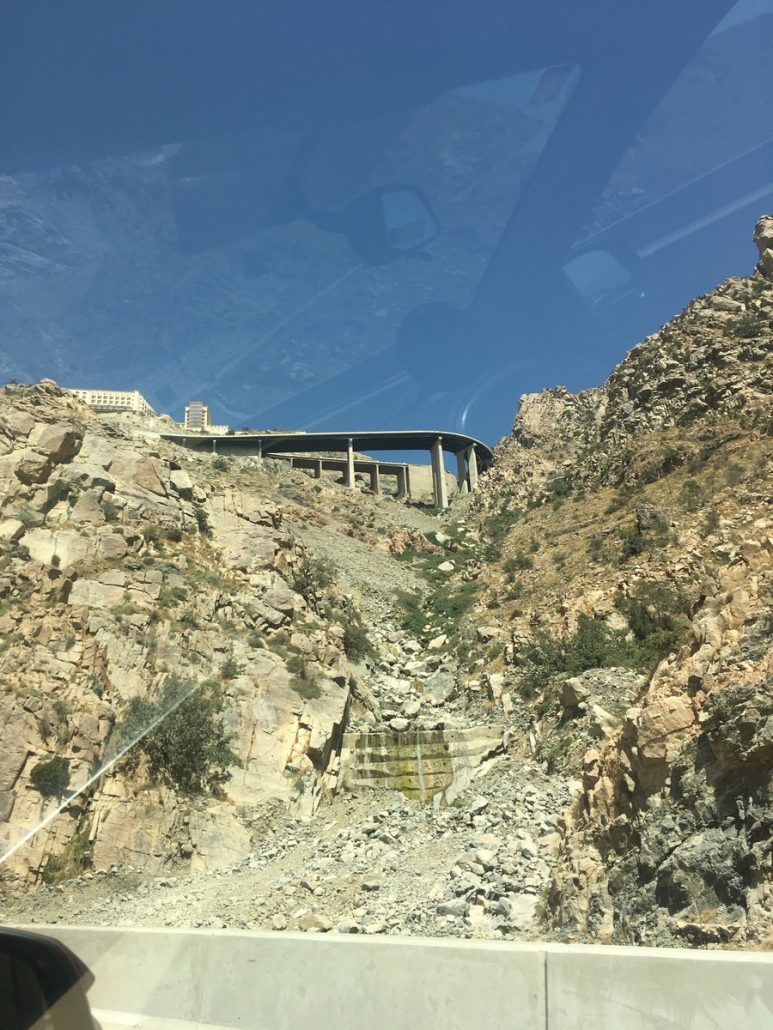
So it was that Ragi and I landed up at the Al-Kamal Rose Factory in Ta’if after a two hour drive switchbacking our way up the mountain escarpment. Entering the premises, we were greeted by a small garden of stunted rose bushes which had just been picked, their leafy, thorny branches devoid of any colour beyond an almost uniform deep green. It was a demonstration garden; as we were later to find out, it takes much more than just a couple of rose bushes to create rosewater.
We were greeted by Abdulrahman Kamal, an enthusiastic member of the Al-Kamal family who own and operate the factory. After plying us with apple pie and Arabic coffee he led us through a corridor into the extraction room.

It hit us the moment we entered the room; the delicate, flowery sweet scent of rose petals, filling every corner of the space. The long, dimly lit room looked like any barn, except for the bar down the centre containing a trough of water. On one side of the bar were lines of large glass jars, each topped with foil seals and seemingly connected to the trough with a pipe. On the alternate side were earthenware pots with steels heads and matching pipes.

Abdulrahman disappeared through a door and quickly returned brandishing a basket brimming with pink rose petals. Picking a bunch up in one hand, he invited us to run our hands through the silky ribbons of floral fragrance. The petals were soft and velvety, almost vulgar in their satiny luxury. I suddenly understood the term “a bed of roses”; if you have never experienced the sensual opulence of so many rose petals in one sweep, I highly recommend it.
“20,000 to make a jar of rosewater” proclaimed Abdulrahman proudly. “It takes 20,000 petals to make a small jar of rosewater”. Ragi and I looked at each other astonished; as in situations like these, it begged the question of what that quantity would look like. “This basket” replied our helpful guide.
He went on to explain how the system worked; burners in the earthenware pots heated water in the silver pots above. The twenty thousand petals are added to the water, and as the steam rises it passes into the steel head and down the pipe towards the trough. The pipe remains sealed as it travels through the trough, and the surrounding cool water bath causes the steam to condense. As the pipe exits the trough on the other side, pure rosewater drips into the glass jar.
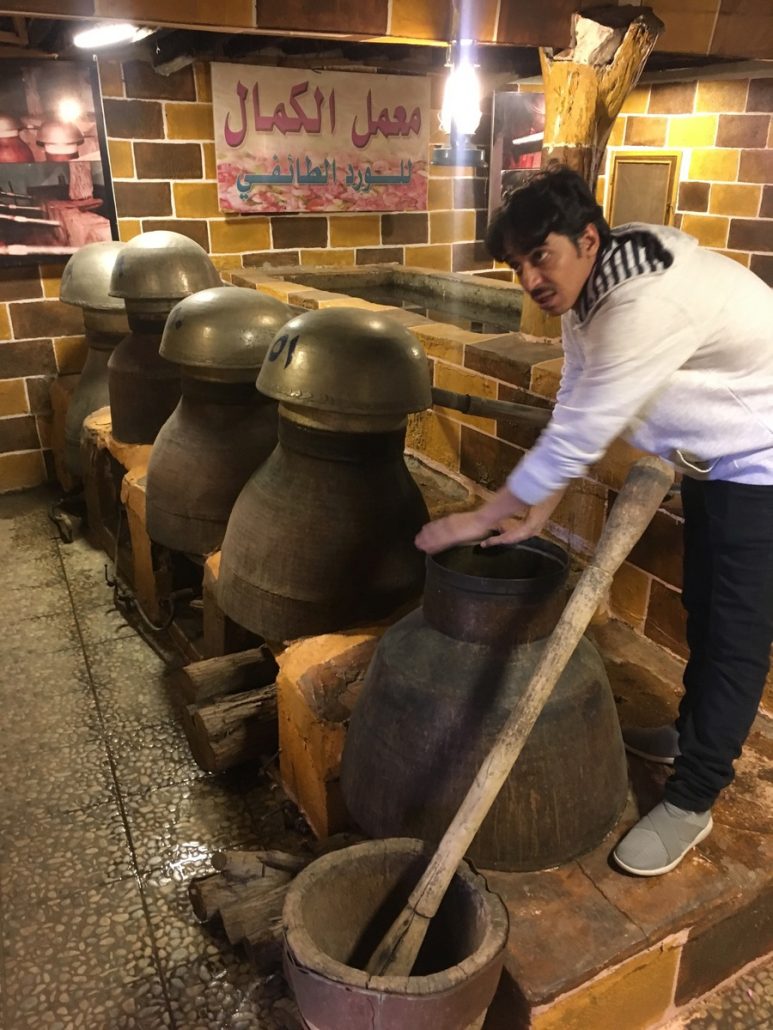
The burners were fed by gas, but Abdulrehman led us into another, apparently older room where the fires were fed by wood. “The traditional way” he explained. “We also make rose perfume here… we repeat the process with the rosewater – so the rosewater is then reboiled with 20,000 more petals, and the result is perfume”
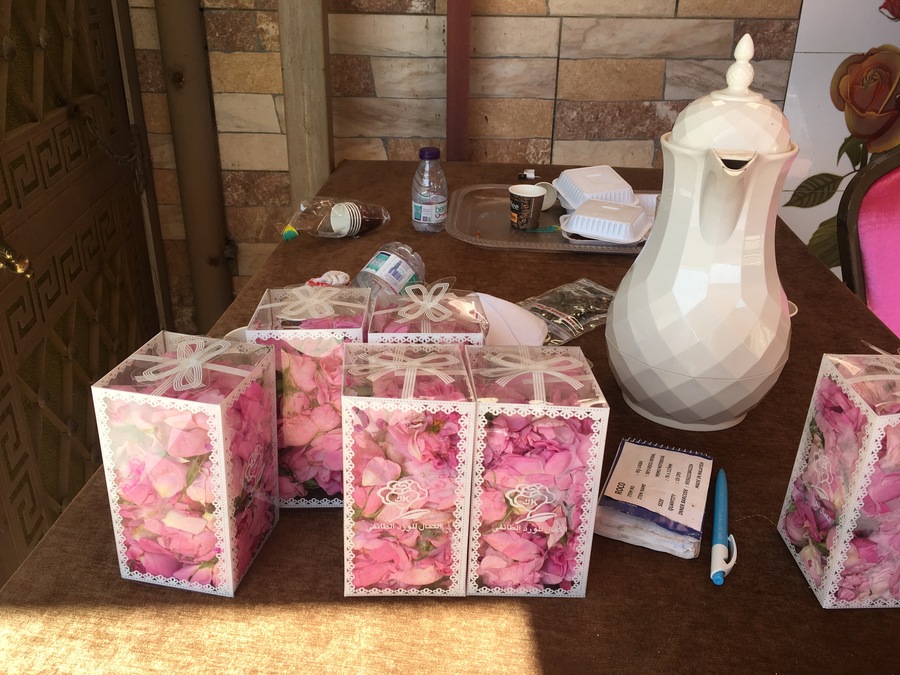
We continued through the room until we reached what what appeared to be the gift shop, a corner of the room taken up by a lounge set high above the floor. We were shown to our seats, and then promptly brought small glasses of rose-spiked tea, the perfect way to round out our visit to this intriguing factory. The tea was slightly bitter, but aromatic, like our surroundings, and heavenly to sip. Like the basket of rose petals in the other room, there was something luxurious about this, something so sumptuous that we felt like royalty.
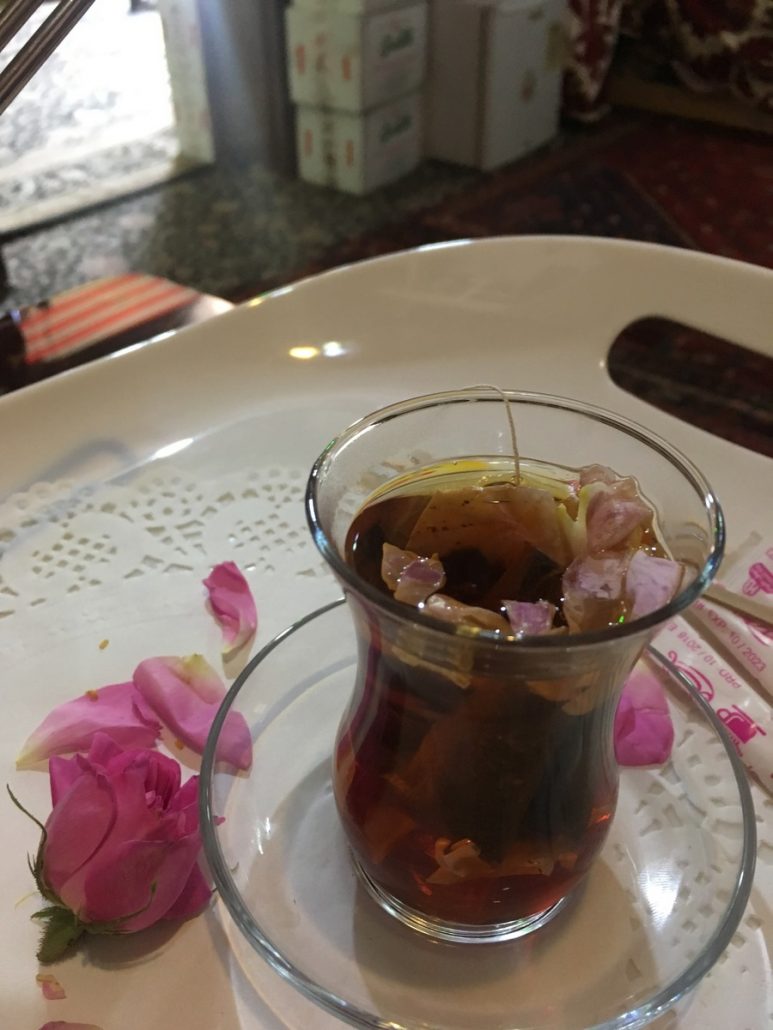
We left, smelling like roses and our heads full of the delicate scent and idea of this decadent petal that has travelled far and wide but arguably began here, in the evocative mountains of western Saudi Arabia.
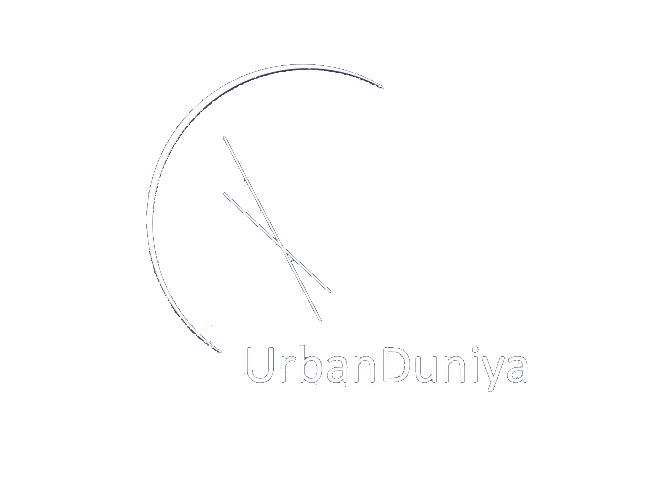
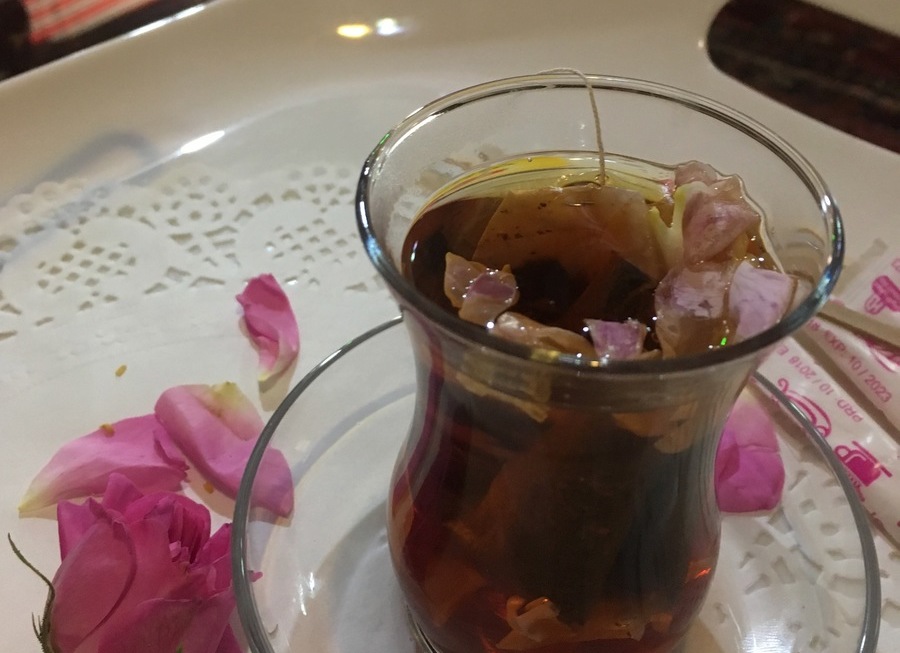


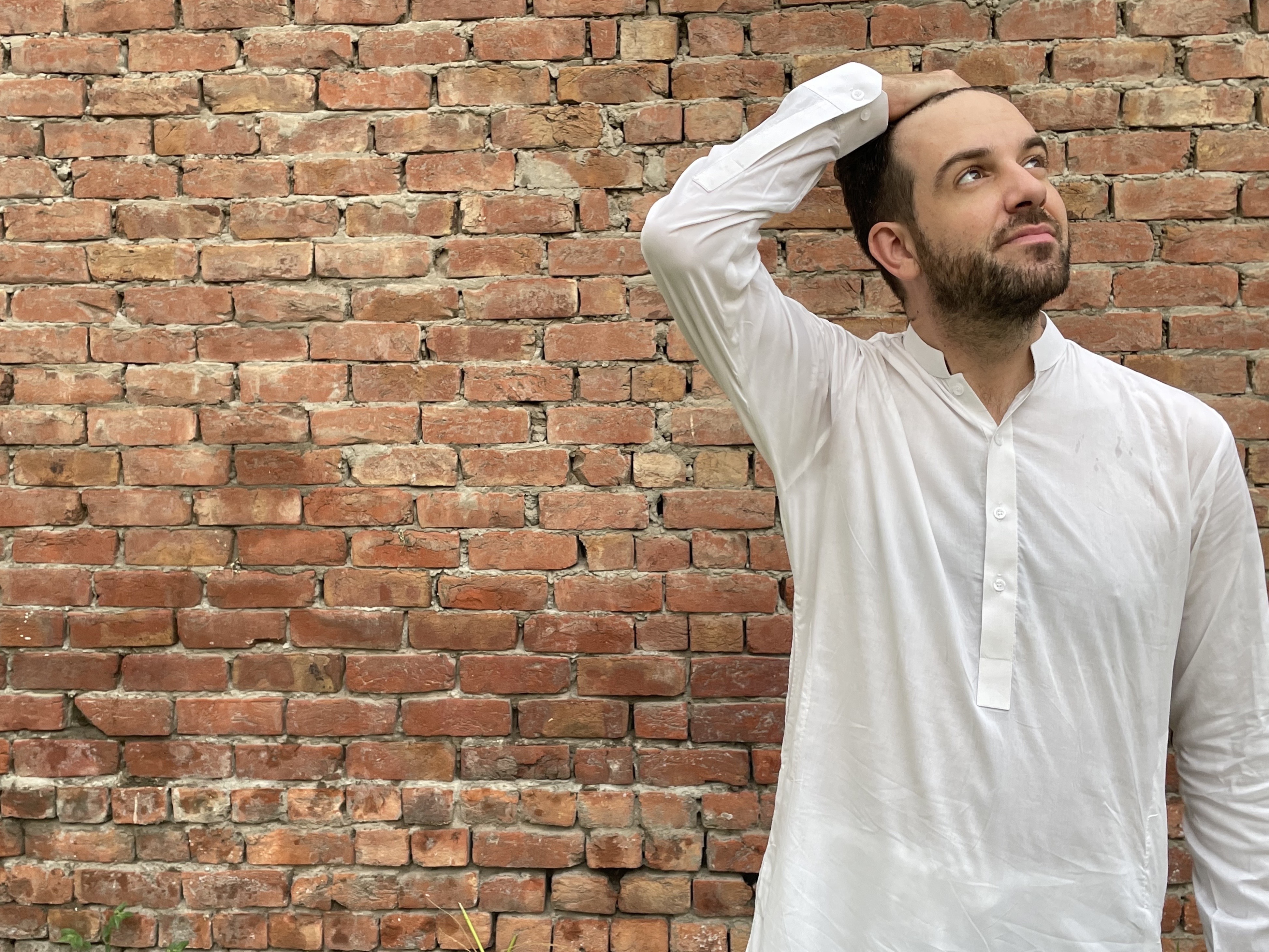
what a great little tour! And nice to know there are places in Saudi Arabia where it’s a little cooler!
True! Thanks for reading, Andy 🙂
All your middle-eastern posts are so intriguing. You know what, I find middle-eastern countries more fascinating and interesting than some of the popular Asian countries.
Thanks for reading, Renuka!
This is so insightful and evocative. I really like your writing style, it’s so different and interesting. I’m so intrigued about these offbeat places that offer such unique experiences.
It was perfect the first time. I learn so much from you as well! Keep it up great post.
Thanks for taking us along on this tour… I could almost smell the fragrant roses! I found your blog through Andy’s sharing of your Mekkah videos.